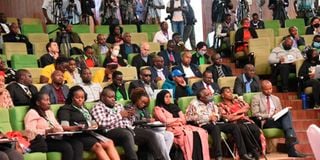Satellite modems to serve areas not covered by network

Stakeholders follow proceedings at Bomas of Kenya during the testing and simulation of the IEBC results transmission system on June 9, 2022. The electoral commission will deploy over 1,500 satellite modems to polling stations with no network coverage.
The electoral commission will deploy over 1,500 satellite modems to polling stations with no network coverage, use photocopy foolproof ballot papers and firewalls to protect its results transmission system from infiltration.
This was revealed Thursday as the Independent Electoral and Boundaries Commission (IEBC) rolled out what it said will be a foolproof system ahead of the August 9 elections. This even as a simulation of the system revealed glaring technological hitches and delays in transmission of results, raising questions on its efficiency. IEBC said it has in place 1,553 units of satellite modems that will be deployed across the 1,111 polling centres, which are out of 3G or 4G network coverage for results transmission.
IEBC chief executive Marjan Hussein Marjan said the results will pass through a secure path using a firewall system to secure the servers to ensure only legitimate users are able to access the system.
Encrypted channels
The network channels that will be used in the transmission will also be encrypted using virtual private network on top of the normal network as part of mechanisms put in place to ensure the channels are secure and no one is able to alter the images from form 34A.
The system will also boast of intrusion detection and prevention systems to detect any interference with the system during the transmission process.
“Each form will come with time stamp showing the location for easy verification of where the form is coming from and the device used and encryption,” he said.
IEBC has picked Safaricom, Airtel and Telkom as mobile network infrastructure providers where the kits will have slots for two Sim cards with Safaricom the main one and others as backups depending on relative network strength.
The kits will also have internal batteries and two power banks for backup and, in case any gets lost, it will be deactivated immediately.
“Where there will be delays, we will work with the service providers to make sure the results trickle in faster. Traffic will go up and down because of simultaneous transmission after tallying,” he said. The assurance comes after stakeholders, including political parties’ representatives and civil society groups, raised questions on the efficacy of the results transmission system.
The test run, which had a sample size of 2,900 polling stations picked from the 1,450 wards in the country at two each, began 18 minutes to 4pm.
However, more than an hour later, only 982 form 34As had arrived by 5pm and by 6pm less than 1,500 forms had been received.





